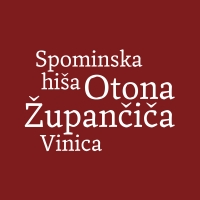Difference between revisions of "Oton Župančič Memorial House"
Janez Premk (talk | contribs) |
Janez Premk (talk | contribs) |
||
| Line 26: | Line 26: | ||
{{Teaser| | {{Teaser| | ||
| − | Dedicated to Slovene poet Oton Župančič (1878–1949), the [[Oton Župančič Memorial Collection]], established in [[established::1991]], is installed in a house erected on the site of Župančič former homestead in Vinica, which burned down in 1888, in the centre of Vinica | + | Dedicated to Slovene poet Oton Župančič (1878–1949), the [[Oton Župančič Memorial Collection]], established in [[established::1991]], is installed in a house erected on the site of Župančič former homestead in Vinica, which burned down in 1888, in the centre of Vinica. |
}} | }} | ||
| + | |||
| + | == Description == | ||
| + | Beside the plaque of Oton Župančič birth, there are also two other plaques commemorating the birth of teacher Franjo Lovšin (1863–1931), also born in the same house, and of the native Dr Oton Berkopec (1906–1988), Slavist, poet and translator, to whom an exhibition on the upper floor of the house is dedicated. In the garden there is a bust of Oton Župančič, carved by sculptor Jakob Savinšek. | ||
== Exhibitions == | == Exhibitions == | ||
Revision as of 20:25, 14 February 2010
Description
Beside the plaque of Oton Župančič birth, there are also two other plaques commemorating the birth of teacher Franjo Lovšin (1863–1931), also born in the same house, and of the native Dr Oton Berkopec (1906–1988), Slavist, poet and translator, to whom an exhibition on the upper floor of the house is dedicated. In the garden there is a bust of Oton Župančič, carved by sculptor Jakob Savinšek.
Exhibitions
The exhibition in one small and two big rooms on the ground floor first introduces visitors to the poet's family, his childhood and youth, with photographs and documentary material. The cultural and social environment in which Župančič grew up is also illustrated, with special emphasis on the emigration problem in Bela krajina. The next room presents a chronological survey of Župančič's literary and other work, together with a survey of published and translated works and his translations of foreign authors. Župančič often used the names of ethnological objects in his poetry and in the last room poems of that kind are exhibited and illustrated by the objects the poet refers to.



